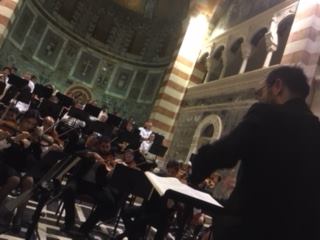“I just want to feel safe,” said Abu Ali from his makeshift couch in an al fresco sitting room in the Gaza City neighborhood of Shujaiya. The wish is as simple as it is elusive for Abu Ali and nearly everyone else in #Gaza. I’ve heard the phrase repeated again and again over the last week – from refugee camps to the vegetable market; from offices, living rooms, restaurants and hotels; from the beach and the harbor.
“I just want to feel safe.”
For Abu Ali, living near the Israeli border in Shujaiya turns that wish into a mocking fantasy. As we spoke, an Israeli drone buzzed overhead – often a harbinger of another rocket attack. In 2014 Israel leveled a blocks-long section of Shujaiya with 7000 shells in barely an hour. It was an attack so devastating that a retired American general declared, “Holy bejeezus!” He called the rate of fire “astonishing” and “absolutely disproportionate.”
During that war, “I got a call from the Israeli shabak [intelligence], saying, ‘You must leave this area,’” recalled Abu Ali, sitting in the filtered morning light beneath a lattice of grape leaves. Clucking chickens in his vegetable garden can’t quite drown out the sound of the drone. After the Israeli warning, Abu Ali started to move his family to his brother-in-law’s house, but as they left, he recalls, they came under shell fire from Israeli tanks. Eventually, they reached the relative’s house, where they lived for weeks, 50 people in two rooms.
Months after the 2014 war, Abu Ali finallly returned to discover his home – the one he saved to build by working construction in Israel for 30 years – completely destroyed. Over the next year, with funds donated from Saudi Arabia, he rebuilt it, adorning his front entrance with repurposed leftover tank shells. He fears for the next attack. “I want to feel safe. I want to sleep well. I don’t feel relaxed here in my home. Nobody can stop the Israeli attacks. Who pays with their blood? The people.”
The level of death, crippling injury, lasting trauma, sudden homelessness and nonstop fear is difficult to comprehend, much less calculate, outside of a war zone like Gaza. The broader casualty numbers are familiar to anyone who follows the story closely, but what floors me on this trip is learning how much loss individual families endured. One Gazan, now in Ramallah, lost 37 members of her family in the 2014 war. Not a typo. Thirty-seven, including seven young men in a single bombing. “They were not part of any militant organization,” said Tahani Abu Daqqa, former Minister of Culture for the Palestinian Authority; they were just young Palestinian men. Abu Daqqa tells me Israeli rockets also destroyed her Gaza home, even though, after Israeli warnings, it was empty and the neighborhood abandoned. As we spoke her phone kept lighting up and emitting little dings: updates on the evening’s killings from the ongoing Israeli attacks in Gaza, including a 14-year-old boy.
Stories of massive loss come simply for the asking. My translator and guide, Raed Athamneh, lost 18 members of his family, including brothers, uncles, and grandparents, in a 2006 attack, and 56 more were badly wounded. He’s had to rebuild his own home twice. “The important thing in my life is just to feel safe,” he tells me, repeating the Gaza mantra as we stand on a rise above the seashore. “That’s it. I don’t want to be a millionaire, I don’t want to be anything, just to feel safe, and have my kids safe.” A bullet, a bomb, a drone, a plane – from any of those, Raed tells me, “my life could change in minutes.” And so he feels always nervous. Always. “When my wife calls me, I say, ‘what happened?’ Directly I want an answer. What’s going on? Because I don’t feel safe.”
“I just hope for everything to be calm,” he says, fixing his eyes on mine, imagining that day. “I stay with my family, we relax, we enjoy.” Perhaps a summer day on the beach below us, under an umbrella with some barbecue and minted lemonade. No fear, no tension, no terror when family members call him on his cell phone. “Safety life,” Raed tells me.
“I just want to feel safe.”






![Demonstrators opposed to the construction of the Thirty Meter Telescope on Mauna Kea block access road. [Bruce Asato / Honolulu Star-Advertiser ]](https://images.squarespace-cdn.com/content/v1/56cb90c160b5e9383c0e99cd/1571219749320-2K539E7A6Q23AIS5XAIT/Sandy+Mauna+Kea_Bruce+Asato_+Honolulu+Star-Advertiser.jpg)






![Mousa Hilleh, 48, rebuilt his home after the 2014 Gaza war and says not having access to clean water is a major concern [Abdel Kareem Hana/Al Jazeera]](https://images.squarespace-cdn.com/content/v1/56cb90c160b5e9383c0e99cd/1541127114734-MH1CKALCZ4G65IHREVBP/AJ_Abdel+Kareem+Hana.jpg)
![A Palestinian woman bathes her son with water from a tank filled by a charity inside their dwelling in Khan Younis in the southern Gaza Strip July 3, 2017 [Mohammed Salem/Reuters via Al Jazeera English]](https://images.squarespace-cdn.com/content/v1/56cb90c160b5e9383c0e99cd/1541125763140-RU48I5KDGWU44XQ9JMF8/Reuters+photo_AJ.jpg)









